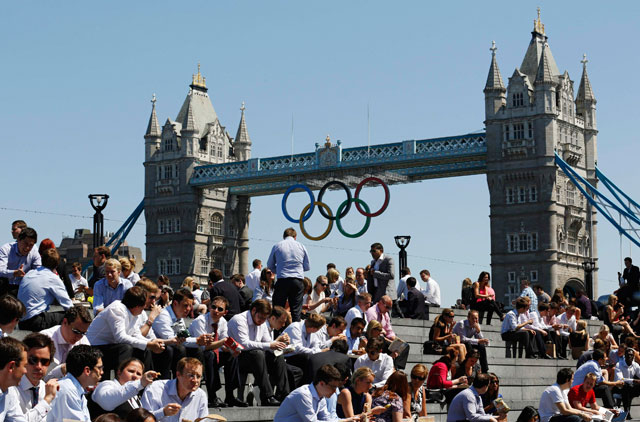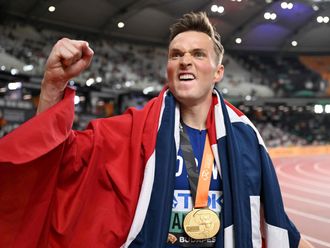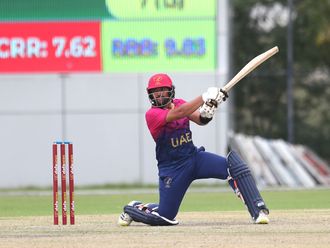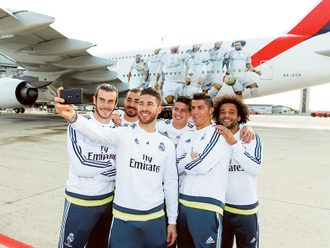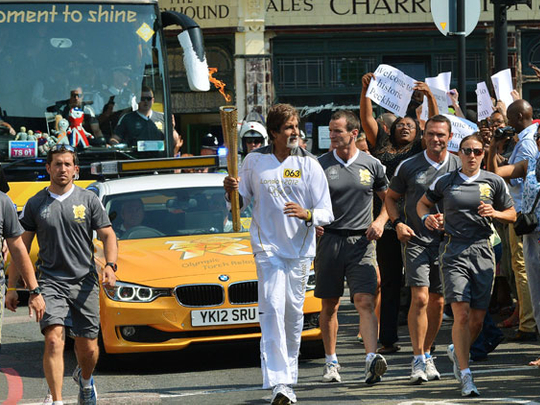
London: It is a little after 6am. If you ever go to London, then try taking a walk across the banks of the river Thames. The tide is low and the waters gently lap against the wall. The boats are docked, except for the bobbing and straining against the anchors that hold them down in the river bed. There is a certain calming stillness which is almost therapeutic in nature; a sense of tranquility if you will, just before the unleashing of a storm.
In the distance Tower Bridge is lit up with the Olympic rings. It seems as if this medieval monument is wearing a pair of kaleidoscopic sunglasses. On the north bank of the river lies the Tower of London, a structure that tells tales of unspeakable horror and cruelty in ancient times. The London Eye is a mute spectator as it surveys the city from its own lofty heights. The Houses of Parliament are majestic, all-encompassing in their length and breadth, but eerie in their silence.
This is the spot from where London looks most majestic. History seeps out of every building wall, every mausoleum, every statue erected in memory of its favourite sons; every nook and cranny of space is jostling for the right to tell its own tale.
The air is cold, a mist can be seen forming in the distance and slipping in and out of the steel girders of Tower Bridge. The ground is wet with freshly fallen dew. There is a smell of moisture and freshly cut grass. It is a gentle reminder that the city and its history counts for nothing without the presence of the natural elements.
In a way it is reassuring, because you cannot have one without the other. Elsewhere, the Olympic clock stands alone with only Nelson’s Column keeping it company in Trafalgar Square. The clock had been unveiled 500 days ago. The time it had been programmed to is slowly ticking down to zero hour. Time flies. The fuse has been set for today.
Throw in a little musical score in the background as you take this walk. Lose yourself in a bit of Chariots of Fire nostalgia. Will your senses to rise and fall to Vangelis’ poignant score. Ensure that the refrain works its way into your head, mind and body. Remind yourself of the story that runs concurrently with the score in the movie: two sprinters running for their own personal cause in the Olympic Games.
A city begins to slowly awake from its slumber. The mechanics for the day are being put into motion — the first signs of life are from London’s public transport system: buses have begun to fire their engines and the first train is slowly snaking its way out of the shed, its motorised mind steeled to meet the onrush of humanity as it begins its surge.
As if in tandem people are waking up from their night’s sleep and getting ready to pace themselves through the day. The movements and the routines are familiar; it is a customary drill for the inhabitants.
Each of them begin to leave their homes — people of all shapes and sizes, all ages, from all nations, faiths and communities — lost in an accustomed movement as they go out in search of a purpose, just as they have done the day before, the day before that and every year before this year. It’s like an impeccably manipulated parade as they go out in search of a dream, armed with hope, ambition and self-belief that it might all come true one day.
It’s just like being in a race, except that this is no ordinary year. It is the year of the London Olympics, mankind’s historical sporting moment, which is being staged in a city that has embraced history and modernism and held it close to its breast.
London and the Games are united now. Together they clasp hands as they prepare to share the same space together. Eight years of planning and preparation has now reached the point of climax.
The athletes in the Olympic Village housed at the East End are also beginning to sense that the moment of glory, or failure, is now upon them. They prepare to stretch and recall their ambitions and goals, muscles tensing as they prepare for speed, flight and strength.
It is all tuned towards one great culmination. To believe that the purpose that they have trained for is but one step, jump and lunge closer; to be able to taste defeat and failure and clutch it in their sweat-ridden palms. To be able to discern for themselves, as they say in athletics dictum, if everything is up to speed.
The greatest festival in contemporary society is primed to begin today, and if the world requires any country to provide proof of its nationhood, then all they need to do is stay glued to their TV sets and watch as they take a stroll around the Olympic Stadium during the opening ceremony.
With each Olympic Games the world provides new evidence of its ever-changing face. The aims and ambitions of the athletes are the same, but as social and political events continue to chart its course, these sportsmen and women find themselves walking under different flags. This process started in Barcelona. It was the first summer Olympics in 20 years that no country had boycotted.
South Africa marched there for the first time in 32 years, since sanctions were lifted. Bosnia Herzegovina made it to the post for their first Olympics, as did the Lithuanians, Estonians and Latvians. North Korea and Cuba also showed up, as did Croatia and Slovenia. A united Germany strolled into the tracks along with 12 former Soviet republics; they shared one uniform but 12 different flags.
Barcelona was dubbed the Universal Games with more than 172 countries participating. But these are just numbers. The most conclusive moment of proof that the world is indeed one, especially when the Olympic ideals are applied to it, came when a 125-yard Olympic flag was unfurled covering the heads of the 12,000 athletes, coaches and representatives. It made everybody anonymous, but it also made them one, irrespective of class, creed, colour, or faith.
The number of nations competing, after joining the Olympic family, has swelled since that momentous day in Barcelona. Beijing hosted 204 countries and London is expected to do the same. Each city has showcased its own personal agendas through the Olympics. These schemes mirror the path that the country has chosen to walk down. Spain’s motto was to be all-inclusive; Beijing chose to herald China’s arrival on the world stage and London will opt for leaving a legacy for its citizens — which means that after the dust settles then people will have access to better homes, parks, transport, daily necessities and the means to a better life. While money wasn’t a criterion for Beijing, as it went about buying a reputation, London has opted to be cost effective since it had nothing to prove in terms of stature to the rest of the world.
There have been many arguments in favour of and against staging the Games during a time of economic frugality in England and across Europe and at a time when the nation’s exchequer is busy picking up deficit bills and struggling to find jobs for its people. But that will now be brushed under the carpet as the stadium opens to the athletes and spectators for three weeks of high-octane sporting action. It is a good way to forget the problems of the present and the impending ones of the future.
There is, however, the small matter of the competition. Fans with tickets will be spoilt for choice. While many athletes will be serving evidence of their potential on a world stage, others will be endorsing their credentials as legends for one last time ahead of Rio in 2016. Each story is a tale of hard work, blood, sweat, sacrifice and tears. Some will end in bitterness, while others will conclude in victory. The beautiful part is that nobody is sure of how the script will unfold, and this is the curious and fickle nature of sport.
This is why participation, at all costs, is the key. The schmaltzy and cheesy marketing line of “you don’t win silver, you lose gold” should be thrown into the bin. There is great honour in being an Olympic medallist. It is, however, equally honourable just to be an Olympian.
Take this moment from the Chariots of Fire as a source from inspiration: Harold Abrahams, one of the two protagonists in the film, subscribes to the view that winning is everything. If he is unable to guarantee success, then he would go as far as not taking part. Abrahams shuns the concept of amateurism in sport (something which the Olympic movement apparently cheers). Therefore, in a fit of pique he tells his girlfriend Sybil, after his loss to Eric Liddell in their first meeting: “If I can’t win, I won’t run.”
“If you don’t run, you can’t win,” she replies with all the practicality she can summon.
The real Harold Abrahams went on to become a lawyer, journalist and British track official, who was instrumental in helping London stage the Olympic Games in 1948.
So here we are in London all over again. Let the Games begin!


